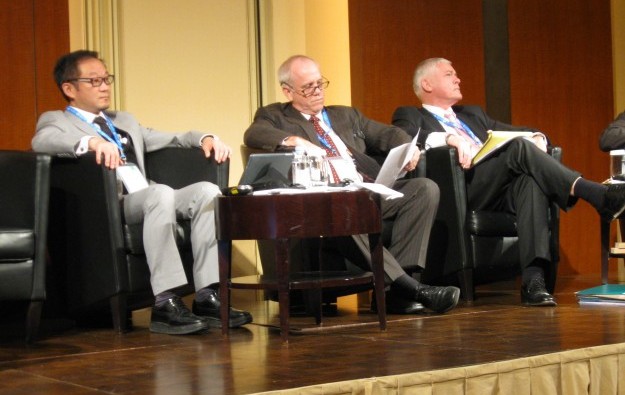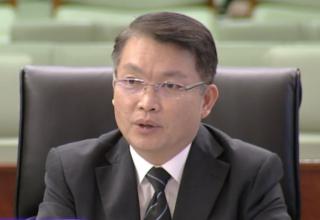Japan could have junkets – with conditions
May 16, 2014 Newsdesk Japan, Latest News, Top of the deck

It’s feasible for future Japanese casino resorts to have VIP junkets – but using the best practice of Australia and Las Vegas, rather than Macau’s system, the Japan Gaming Congress heard today.
“The answer is to pay the government the tax [on VIP play], not like the scenario that we have in Macau, where people other than the government are benefiting, and that’s the fundamental problem in Macau,” said Steve Vickers (pictured, right).
Mr Vickers is a former commander of the Royal Hong Kong Police criminal intelligence bureau and now chief executive of Steve Vickers Associates, a specialist risk mitigation and intelligence firm based in Hong Kong. He was referring to claims that multiplier bets up to six or seven times officially stated bets take place in Macau VIP rooms.
Kelvin Tan (pictured, left), executive vice president and chief of international marketing for Macau sub-concessionaire Melco Crown Entertainment Ltd, suggested that Macau and Singapore represented “two extremes of the spectrum” when it comes to regulatory issues.
He stated: “The big argument for Japan would be to look at jurisdictions like Las Vegas and Australia that have been able to licence proper junket agents from the respective countries [feeder markets] – the established [junket] operators out of Indonesia, Thailand, Singapore, Malaysia, who have been in the business for the last 30 years, and they are genuine junket operators.
“Junket ops – for those of you not in the industry – are like travel agents [are] to the tour industry,” Mr Tan told congress delegates.
“Casinos need them especially in countries where it is not feasible to establish your own marketing offices. So if you look at Australia, and if you look at Las Vegas, that is a really good model to look up to when it comes to licensing junkets,” he added.
Industry sources point out to GGRAsia that a key difference between junket agents in Las Vegas compared to Macau and even in tightly regulated Singapore, is that the agents don’t advance credit directly to the players. In Las Vegas they work instead on a commission or introduction fee, with the casino issuing the marker to the player.
Michael Gore (pictured, centre), a senior industry executive who helped to launch Genting Singapore Plc’s casino property Resorts World Sentosa, and is now general manager of Savan Vegas Entertainment Resort in Laos, said that well-regulated high-volume VIP play in Japan would boost the tax return for the Japanese authorities that would come from casino resorts.
“I would say money is the driving thing. We [the industry] are going to increase government [tax] revenue by bringing in VIP play,” he stated.
Asked whether Macau junkets would be a security threat to Japan’s would-be casino industry, Mr Vickers stated: “I don’t think [Macau] junket operators as now defined, will come to Japan.”
“Some of the [Macau] junket operators – that are coming under increasing [Chinese government] control – are viewed [domestically] as politically sound, and some are viewed as not politically sound,” he added. “The ones that are not politically sound are the ones that are in trouble. That’s the reality.”
“I don’t think it [the Macau junket sector] presents a political or security risk to the Japanese government per se today, but it will depend on how these people [Macau junkets] evolve. Clearly, there are multi-millionaires in these [Macau] junket operations that are close to senior [Chinese] political figures,” Mr Vickers said.
Michael Gore suggested that issues with junkets could in effect be a function of government tax rates. The higher the gaming tax on VIP (35 percent in Macau plus some percentage points for social causes) the greater the incentive for junkets to look for profits elsewhere, he suggested.
“Nevada has six percent [for VIP play], Singapore has five percent for high-end play. I think a fair tax rate will discourage a lot of problems,” said Mr Gore.
But at the following session of the Congress, a panel on anti-money laundering featuring Takashi Kiso, chief executive of the International Casino Institute, and Masayuki Watanabe of Japanese law firm Miyake & Partners, heard that it’s possible that Japanese organised crime gangs – known as yakuza and said to run illegal casinos in the country – might try to infiltrate themselves as shareholders, managers or employees of any casinos – either directly or via relatives.
Related articles
-
 Macau 3Q GDP up 5pct driven by...
Macau 3Q GDP up 5pct driven by...Nov 18, 2024
-
 SJM posts profit of US$13mln in 3Q,...
SJM posts profit of US$13mln in 3Q,...Nov 12, 2024
More news
-
 GKL provides its new table game...
GKL provides its new table game...Nov 22, 2024
-
 The Baron Upright, a new cabinet from...
The Baron Upright, a new cabinet from...Nov 22, 2024
Latest News
Nov 22, 2024
Casino operator Grand Korea Leisure Co Ltd (GKL) says it has achieved its first commercialisation of a new-to-market table game, developed via an in-house competition dating to 2021. Grand Korea...Sign up to our FREE Newsletter
 (Click here for more)
(Click here for more)
Pick of the Day
”As we navigate the final steps of the licensing process, we remain confident in our ability to align with Brazil’s regulatory requirements”
Eusebio Tanco
Chairman of DigiPlus Interactive
Most Popular
 Macau to get 36mln visitors in 2025: Secretary Lei November 21, 2024
Macau to get 36mln visitors in 2025: Secretary Lei November 21, 2024  Gaming technology firm IGT reports hacking incident November 21, 2024
Gaming technology firm IGT reports hacking incident November 21, 2024  EBITDA a focus in Macau market share battle: Jefferies November 21, 2024
EBITDA a focus in Macau market share battle: Jefferies November 21, 2024  Macau 2025 GGR could top US$30bln govt forecast: Citi November 20, 2024
Macau 2025 GGR could top US$30bln govt forecast: Citi November 20, 2024  Macau big-event outdoor venue gets trial run Dec 28: CE November 20, 2024
Macau big-event outdoor venue gets trial run Dec 28: CE November 20, 2024









